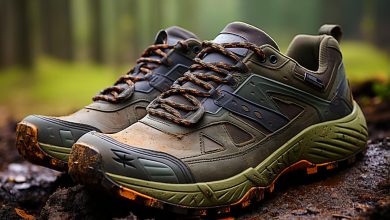Nutrition and Hydration for Trail Runners: Fueling Strategies

Are you ready to hit the trails and conquer those miles? Fueling your body properly is crucial for peak performance.
In this article, we’ll explore the importance of nutrition and hydration for trail runners like yourself. From pre-run fueling tips to strategies for staying hydrated during those long runs, we’ve got you covered.
Plus, we’ll share expert recommendations for fueling your body during recovery. Get ready to optimize your training with evidence-based and practical strategies that will help you reach new heights on the trails.
Importance of Proper Nutrition and Hydration

Proper nutrition and hydration are essential for trail runners to maintain peak performance. As a trail runner, you rely on your body to endure long distances, challenging terrains, and fluctuating weather conditions. By understanding the benefits of electrolyte replacement and the role of carbohydrates in fueling your runs, you can optimize your performance and enhance your overall experience.
Electrolyte replacement is crucial for trail runners as it helps maintain proper fluid balance in the body. During prolonged exercise, such as trail running, you lose significant amounts of fluids through sweat. This loss can lead to dehydration and imbalances in electrolytes like sodium and potassium. By replenishing these electrolytes with specifically formulated sports drinks or electrolyte tablets, you can prevent muscle cramps, maintain optimal nerve function, and support overall hydration.
Carbohydrates play a vital role in fueling your trail runs. They are the primary source of energy that your muscles use during exercise. Consuming carbohydrates before, during, and after runs ensures that your glycogen stores remain topped up. This steady supply of fuel enables you to sustain endurance efforts for longer periods without feeling fatigued or hitting the dreaded ‘wall.’ Incorporating carbohydrate-rich foods such as whole grains, fruits, vegetables, and energy gels into your diet will provide sustained energy throughout your runs.
Pre-run Fueling Tips

Make sure you’ve eaten a small meal or snack about an hour before hitting the trail. Fueling your body properly before a run is essential for optimal performance and to avoid fatigue or muscle cramps. Here are some tips to help you make the most of your pre-run meal:
– Choose easily digestible carbohydrates: Focus on consuming foods that are rich in carbohydrates, such as whole grains, fruits, or vegetables. These will provide you with the energy you need for your run without causing any digestive discomfort.
– Include a moderate amount of protein: Adding some protein to your pre-run meal can help maintain muscle mass and aid in recovery. Opt for lean sources like chicken, fish, or tofu.
– Stay hydrated: Drink plenty of water leading up to your run to ensure proper hydration. Dehydration can lead to decreased performance and increased risk of injury.
Additionally, incorporating energy gels into your pre-run fueling strategy can provide an extra boost of quick-digesting carbohydrates during longer runs or intense workouts. These gels are designed to provide immediate energy and can be consumed easily while on the go.
Hydration Strategies During Trail Runs

To ensure you’re adequately hydrated during your trail runs, it’s important to regularly sip water or electrolyte-rich beverages. Hydration plays a crucial role in maintaining optimal performance and preventing dehydration-related issues such as muscle cramps and fatigue. Here are some hydration techniques to help you stay properly hydrated on the trails:
| Hydration Techniques | Benefits |
|---|---|
| Sip fluids every 15-20 minutes | Prevents dehydration and maintains electrolyte balance |
| Use an electrolyte-rich beverage | Replenishes essential minerals lost through sweat |
| Consider using a hydration pack or belt | Allows for hands-free access to fluids during your run |
| Monitor urine color | Clear or pale yellow indicates good hydration; dark yellow indicates dehydration |
| Plan your route with available water sources in mind | Ensure you have access to refills along the way |
Electrolyte balance is also essential for optimal performance. Electrolytes, such as sodium, potassium, and magnesium, help regulate fluid balance, nerve function, and muscle contractions. When sweating excessively during trail runs, these vital minerals can be easily depleted. To maintain electrolyte balance, consider consuming foods rich in these minerals before and after your runs. Examples include bananas (potassium), nuts (magnesium), and pickles (sodium).
Nutrition Recommendations for Long Distance Trail Runs

When preparing for long distance trail runs, it’s crucial to consume foods that provide sustained energy and support muscle recovery. Here are some nutrition recommendations to help you fuel your body before hitting the trails:
– Pre-run Snacks:
– Opt for easily digestible carbohydrates such as bananas, whole grain toast with nut butter, or a small bowl of oatmeal.
– Include a source of protein like Greek yogurt or a hard-boiled egg to promote muscle repair and growth.
– Don’t forget about hydration! Pair your snack with a glass of water or electrolyte-rich beverage.
– Trail Mix Options:
– Create your own mix by combining nuts, dried fruits, and whole grain cereal for a balanced blend of carbohydrates, protein, and healthy fats.
– Look for trail mixes that contain ingredients like almonds, cashews, dried cranberries, and dark chocolate chips for added nutrients and flavor.
– Avoid options high in added sugars or unhealthy oils.
By fueling your body with these pre-run snacks and trail mix options, you’ll have the necessary energy to tackle those long distance trail runs.
Now let’s dive into recovery and post-run fueling strategies to optimize your performance even further.
Recovery and Post-run Fueling Strategies

After completing your long distance trail run, it’s important to prioritize recovery by giving your body the nutrients and rest it needs to repair and rebuild. Recovery techniques play a crucial role in optimizing performance and reducing the risk of injury.
One of the key aspects of recovery is post-run nutrition. Post-run nutrition should focus on replenishing glycogen stores, repairing muscle damage, and promoting overall recovery. To achieve this, include carbohydrates to replenish glycogen stores and protein to aid in muscle repair. Aim for a carbohydrate-to-protein ratio of 3:1 within 30 minutes after your run. Good options include a banana with peanut butter or Greek yogurt with berries.
In addition to proper nutrition, rest is essential for effective recovery. Allow yourself enough time to rest and sleep following your trail run. This allows your body to regenerate energy stores, repair damaged tissues, and reduce inflammation.
Other recovery techniques that can enhance your post-run recovery include foam rolling, stretching exercises, and active recovery such as light jogging or walking. These activities help increase blood flow, reduce muscle soreness, and promote faster healing.
Conclusion
In conclusion, trail runners, remember the power of proper nutrition and hydration for peak performance.
Pre-run fueling with balanced meals and snacks primes your body for success.
During your run, hydrate regularly to maintain fluid balance and prevent fatigue.
Long distance runs call for strategic nutrition choices like energy gels or bars.
And don’t forget post-run recovery fueling to replenish glycogen stores and promote muscle repair.
By prioritizing proper nutrition and hydration, you’ll pave the path to trail running triumph!






